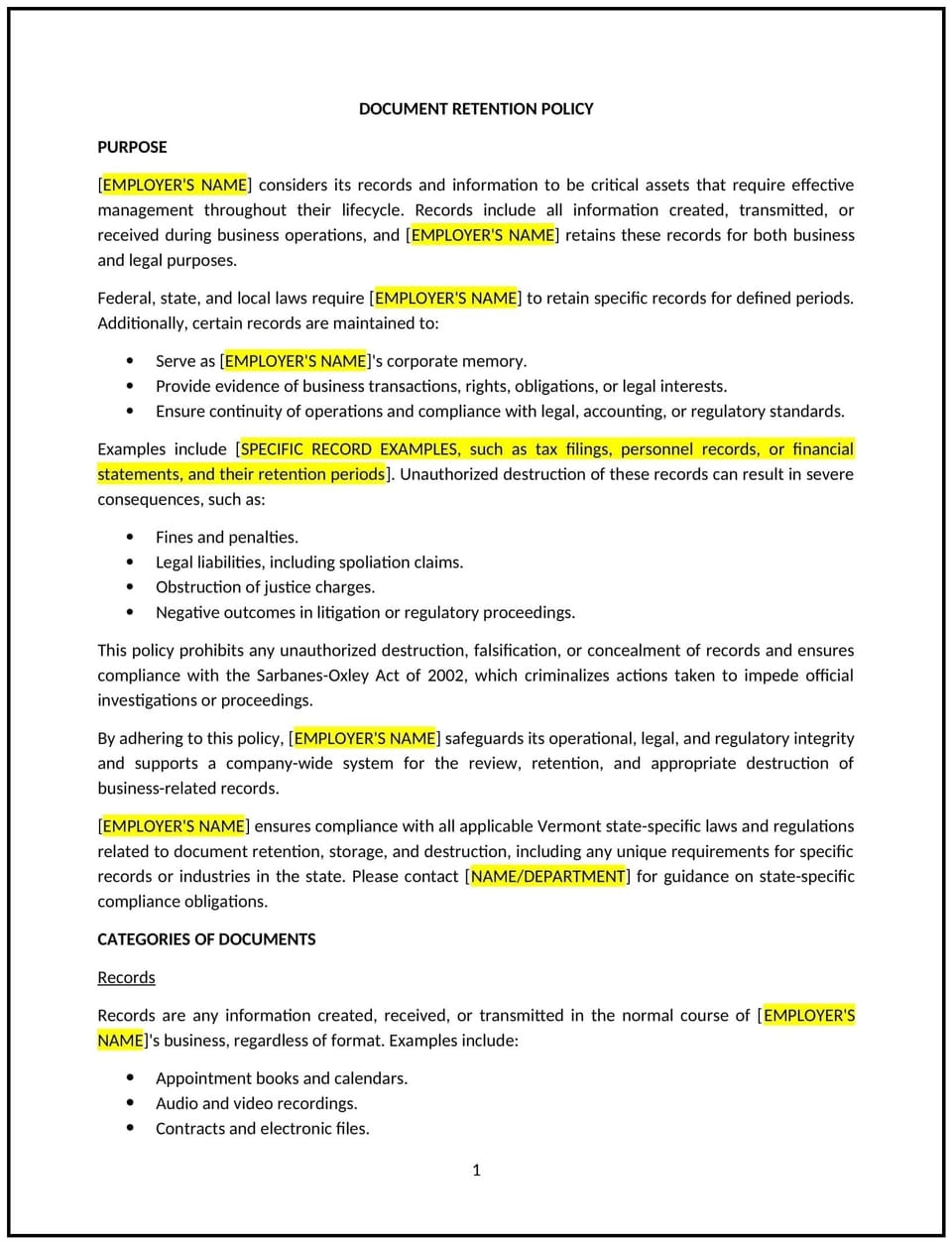Document retention policy (Vermont): Free template

Document retention policy (Vermont)
This document retention policy is designed to help Vermont businesses manage the creation, storage, and disposal of company records while promoting compliance with state and federal laws. It establishes guidelines for retaining documents to meet legal, operational, and historical requirements while maintaining efficient recordkeeping practices.
By adopting this policy, businesses can improve organization, safeguard sensitive information, and reduce risks associated with improper document handling.
How to use this document retention policy (Vermont)
- Define document categories: Specify the types of documents covered under this policy, such as financial records, contracts, employee files, and customer data.
- Set retention periods: Establish how long each document type must be retained based on legal, regulatory, or business needs.
- Outline storage requirements: Provide guidelines for secure storage, whether physical or digital, to protect sensitive information.
- Include disposal procedures: Detail methods for securely disposing of documents once their retention period has expired, such as shredding or data wiping.
- Assign responsibilities: Identify the individuals or departments responsible for managing document retention and disposal.
- Address audits and legal holds: Outline procedures for suspending document disposal during audits, investigations, or litigation.
- Monitor compliance: Regularly review document retention practices to ensure alignment with Vermont laws and organizational requirements.
Benefits of using this document retention policy (Vermont)
This policy provides several benefits for Vermont businesses:
- Strengthens compliance: Aligns with Vermont and federal regulations for recordkeeping and data protection.
- Protects sensitive information: Reduces the risk of unauthorized access or data breaches through secure storage and disposal.
- Enhances organization: Streamlines document management, improving efficiency and accessibility.
- Mitigates risks: Reduces potential legal or financial consequences from improper record handling.
- Supports audits and litigation: Maintains accurate records to assist with audits, investigations, or legal proceedings.
Tips for using this document retention policy (Vermont)
- Communicate the policy: Share the policy with employees responsible for creating, storing, or disposing of company records.
- Train employees: Provide training on document retention guidelines and secure disposal methods.
- Use technology: Implement document management systems to automate retention schedules and monitor compliance.
- Maintain a retention schedule: Create a detailed schedule specifying retention periods for each document type.
- Update regularly: Revise the policy to reflect changes in Vermont laws, industry standards, or business practices.
Q: What types of documents are covered under this policy?
A: This policy applies to financial records, contracts, employee files, customer data, and other records critical to the company’s operations and compliance.
Q: How long should documents be retained?
A: Retention periods vary by document type and are determined based on legal, regulatory, and business requirements outlined in the retention schedule.
Q: How should sensitive documents be stored?
A: Sensitive documents must be stored securely, whether in locked physical storage or encrypted digital systems, to prevent unauthorized access.
Q: What is the process for disposing of documents?
A: Expired documents should be disposed of securely, using methods such as shredding physical records or permanently deleting digital files.
Q: Who is responsible for document retention?
A: Specific departments or individuals, such as HR, finance, or IT, are responsible for managing document retention and disposal as defined in the policy.
Q: What happens if a document is needed for legal purposes?
A: If a document is subject to a legal hold, its disposal is suspended, and it must be preserved until the legal matter is resolved.
Q: How often is this policy reviewed?
A: This policy is reviewed annually or whenever significant changes occur in Vermont laws, business practices, or regulatory requirements.
Q: Can employees access archived documents?
A: Access to archived documents is restricted to authorized personnel, as outlined in the policy, to ensure security and confidentiality.
This article contains general legal information and does not contain legal advice. Cobrief is not a law firm or a substitute for an attorney or law firm. The law is complex and changes often. For legal advice, please ask a lawyer.


